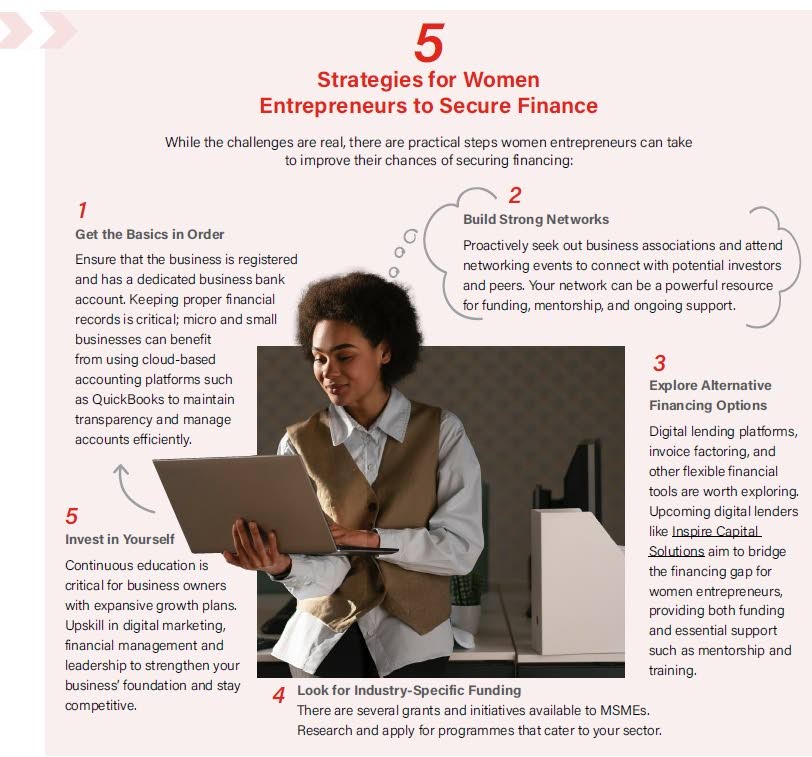Closing the financial divide: Strategies for women-led businesses

Kieran Valley-Gordon
In Trinidad and Tobago, women own just 30 per cent of the approximately 20,000 registered micro, small and medium-sized enterprises (MSMEs), primarily in the micro-enterprise sector.
Barriers like limited access to credit, gender biases in lending and fewer business networks restrict their growth.
Research shows that boosting women’s entrepreneurship could significantly increase GDP and enhance community well-being, as women tend to reinvest in their families.
Gender-intelligent financing approaches are crucial for empowering these entrepreneurs and addressing their specific challenges with tailored support.
Globally, too, only one in three businesses are owned by women. According to the International Finance Corporation (IFC) MSME Finance Gap Study, only 30 per cent of MSMEs are women-owned and these businesses are disproportionately micro-enterprises. Women own 32 per cent of micro-enterprises, versus just 20 per cent of small and medium businesses.
Investing in women: The catalyst for economic growth
Why does this matter?
When entrepreneurship among women thrives, the economy thrives.
McKinsey and Company found that if women participated in the economy equally to men, global GDP could increase by US$28 trillion, or 26 per cent, over ten years compared with a "business-as-usual" scenario. Research by the IFC also shows that women entrepreneurs tend to hire more women, contributing to broader female labour force participation.
Therefore, the ripple effect of encouraging women's entrepreneurship moves us closer to McKinsey’s full-parity scenario.
The impact goes beyond economic growth. Studies by the Cherie Blair Foundation reveal women are more likely than men to reinvest a significant portion of their income back into their families and communities, boosting education, healthcare and overall community well-being.
Women-led businesses are also more likely to focus on sustainability and long-term benefits, according to research from the Goldman Sachs 10,000 Women initiative.

Supporting women entrepreneurs is good for the economy and for local communities.
We recognise, of course, that entrepreneurship, male or female, is an individual choice and that factors other than access to credit, such as the disproportionate allocation of unpaid work and caring for the young and the elderly, affect women’s flexibility to participate in the labour market both as business owners and as employees.
However, if we agree that there is economic and social benefit to encouraging greater participation by women in entrepreneurial activities, then providing appropriate and productive access to finance must be seen as one of the critical enablers.
The case for gender-intelligent financing approaches
While TT has programmes that support MSMEs, few are specifically designed for women entrepreneurs.
One exception is Republic Bank’s partnership with Business and People Development Associates Ltd (BPD), which sponsors cohorts of women to participate in BPD’s Entrepreneurs Business Builder (EBB) programme. This programme helps women gain valuable skills, and, more importantly, offers access to financing.
However, the traditional financing models are typically gender-blind in approach, failing to recognise the specific challenges women entrepreneurs face.
Women business owners often have less access to business networks and markets, which limits their exposure to potential clients and investors.
These entrepreneurs also face significant barriers in accessing credit, as traditional financing often requires high levels of collateral, which many at the micro and small stages cannot meet.
Additionally, biases in lending practices – whether conscious or not – further disadvantage female entrepreneurs.

That’s why gender-intelligent financing is crucial. These approaches consider women entrepreneurs' specific challenges and offer more tailored solutions.
For example, offering lower collateral requirements, flexible repayment terms and programmes that provide mentorship alongside capital can increase the likelihood of success for women-led businesses. Fintech solutions, such as digital loan platforms, provide new avenues for women to access financing more efficiently.
Success stories: The right support can unlock growth
Nikita Legall, founder of Tropical Hives, participated in the EBB programme, during which she gained valuable skills and regional networking opportunities with fellow women entrepreneurs.
This support enabled her to access funding from Republic Bank.
The EBB programme helped Legall focus on growing her business instead of getting caught up managing daily operations, leading her to participate in the Youth Agricultural and Homestead programme. She recently graduated from the first cohort of that programme, securing two acres of land and $20,000 to expand her farm.
Meanwhile, Crystal Joseph, founder of Aviaire Body TT, participated in the Export Action programme by Eximbank in collaboration with the TT Manufacturers’ Association (TTMA).
The programme provided technical assistance and guidance in getting her business export-ready. This allowed her to expand distribution, and she now successfully offers Aviaire products worldwide.

Comments
"Closing the financial divide: Strategies for women-led businesses"